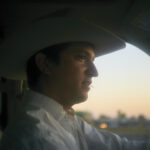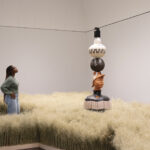UT Press Celebrates 75 Years of Publishing

Why is a raven like a writing desk?
Lewis Carroll’s Alice in Wonderland asks this nonsensical question of its eponymous main character.
Why is publishing books like doing the dishes?
That’s a question I found myself asking Robert Devens, director of The University of Texas Press. This time, the answer makes perfect sense.
“It’s the tactile quality of it,” Devens says, mulling over his oddball simile in the press’ offices in Tarrytown. “Doing dishes is the one thing where I have no question that the situation is better when I’ve finished than when I began. A lot of the way we lead our lives—the good effects that you might have—maybe you don’t see them. Maybe they’re distant from the work itself.” But Devens sits surrounded by his effects: dozens of books he’s shepherded from acquisition to publication throughout a career at the University of Chicago Press and at UT Press since 2013. “This is a job that matters. If I can catch an edit that nobody else caught, it means that this book is going to be all the better for it. All I want to do is to make something better.”
After more than a decade in Austin and four years in the director’s chair, Devens now must meet the unique opportunity of representing the past 75 years of the press, which amounts to more than 4,000 titles published.
Some of the books are more recognizable than others. The distinctive red, green, black, and gold cover of Hanif Abdurraqib’s Go Ahead in the Rain: Notes to A Tribe Called Quest spent two weeks on the New York Times Best Seller list—a monumental achievement for any university press. The lowercase yellow serif on the cover of Alcalde contributor Stephen Harrigan’s Big Wonderful Thing is a centerpiece at many local bookstores, alongside countless other UT Press authors, many of whom have appeared in the pages of this magazine through the years. And for every trade book (the industry term for books marketed toward the general public), UT Press has a dozen other academic monographs and journals, going back decades and transforming myriad fields of scholarship.
Before the formal organization of UT Press in 1950, the University’s printing division had used the name “University of Texas Press” since 1922 for printing and distributing books by UT faculty or their departments. This is not the traditional purpose of a university press, which functions more like a publishing house than an on-campus printer.
Founder Frank H. Wardlaw came to Austin after starting the University of South Carolina Press (and was later lured away to establish the Texas A&M University Press in 1974, which celebrated its 50th anniversary last year). Even in its early years, UT Press was pivotal in forming the canon of Latin American authors in translation, including works by Juan Rulfo, Octavio Paz, Jorge Luis Borges, and Pablo Neruda.
The scholarly journals division was established in 1976, giving UT one of fewer than 20 university presses in the nation to have a journals department. Gifts from James Michener established two editorial fellowships in 1986 and 1999. The press also earned its first New York Times Best Seller in 1997, T.H. White’s The Book of Merlyn, an epilogue to his The Once and Future King trilogy.
Angelica Lopez-Torres, BA ’11, started as an editorial fellow after earning her master’s with a certificate in scholarly publishing from Arizona State University. After five years in a full-time editorial role, Lopez-Torres is now the international rights manager, responsible for getting UT Press’ material into different formats and languages around the world.
“I was in my junior year as an English student at UT when I started really thinking that I’d like to do publishing as a career,” Lopez-Torres says. “A UT professor was looking for a work study student to help him transcribe some interviews and do some proofreading for his book. And lo and behold, he was submitting it to UT Press for acquisition. That was my first time realizing, Wait a minute. We have a publisher on campus.”
UT Press is considered one of the “Campus Gems,” along with institutions including the UT Libraries, the Harry Ransom Center, and the Blanton Museum of Art, which all report to the Office of the Executive Vice President and Provost. These are the peers that Devens wants to involve in the yearlong celebration of the press’ 75th anniversary.
“The anniversary is first and foremost a time for us to make deeper connections with many stakeholders,” Devens says, from readers to donors, to UT faculty and staff. “We want to tell the story of the press to help people understand the breadth of the work that’s been done here—to help them see the huge value that a great university press brings to its university and to its community.”
Perhaps even more challenging than wrapping one’s head around the sheer volume of text to come out of the press since 1950, is attempting to quantify its impact.
“And the books do make an impact,” says Casey Kittrell, UT Press editor-in-chief since 2023. Kittrell first joined the press in 2004 and is the acquiring editor behind Go Ahead in the Rain and some of the press’ most popular music writing. “Francesca Royster wrote a book that we published two years ago called Black Country Music. And as that became a topic of conversation [after Beyoncé released the concept album Cowboy Carter in March 2024], Francesca was everywhere. She had written the book on it.
“It’s just a privilege to be part of a piece that does that, that helps unlock something for all these other scholars or helps all these people who didn’t understand that there was such a thing as [a certain genre.] You always want to feel like the book has done more than entertain people,” Kittrell says.
Kittrell and I were among a packed house on April 16, 2024, at local bookstore First Light Books in Hyde Park for the launch of Kathleen Blackburn’s book tour for Loose of Earth, a memoir about her evangelical family and its devastation due to the presence of carcinogenic “forever chemicals” in West Texas. Books like Blackburn’s epitomize the UT Press model: writing with rigor and specificity about broadly significant topics.
Among shelves stacked with the hottest fantasy reads, classics of children’s literature, and front-list trade titles, Blackburn spoke of the support she received from Kittrell (her acquiring editor) and the entire UT Press staff.
“I was so thrilled that the book found a home with UT Press,” Blackburn says when I catch up with her at the Texas Book Festival in November. “They don’t do a project unless they are passionate about it and think that it’s important for readers. They’re smart and daring, and they’re innovative … Casey Kittrell saw what the project could be, and he helped me take it all the way there. And [the sales and marketing team], they’ve all just been champions of the book, and they’ve turned it into something that is so much bigger than me.”

“We put a lot of stock and faith in booksellers,” says Gianna LaMorte, the associate director and sales and marketing manager for the press. She came to UT Press around 15 years ago after a career at Random House. Though not a Texan by birth, she’s adopted the word “y’all” into her vocabulary and can wax poetic with the best of ’em about how special Texas is as a place.
“And when I say we have faith in booksellers, I’m not kidding,” LaMorte says. “I mean, I’m romantic about it. Booksellers are on the front line for whatever might come their way.”
LaMorte is largely responsible for introducing the press to the national stage. She was one of the very first salespeople to reach out to First Light before it opened in August 2023, before even some of the traditional publishing houses and distributors. She also made UT Press the first university press to engage with the bookselling community at the Winter Institute of the American Booksellers Association, an annual, nationwide gathering for the industry. In the years following, Princeton, Yale, and other powerhouse academic institutions would follow her lead.
“You have certain reputations as an academic press,” LaMorte says, “that your books are too expensive [and] your terms aren’t friendly to booksellers. I spent two or three years convincing booksellers that none of that was true—that we weren’t going to try to sell them hundred-dollar books about things that wouldn’t speak to their customers.”
A few months after Blackburn’s event, for example, UT Press celebrated another release at the same bookstore: Home, Heat, Money, God, a survey of modern architecture in Texas from historian Kathryn E. O’Rourke and photographer Ben Koush. With UT’s top-ranked architecture program, Kittrell points to the subject as one of the strengths of the press that follows naturally from the expertise already on campus. (Among others: film studies, Latin American studies, Middle Eastern studies.)
On the other hand, Devens mentions the recent recognition by Oprah Daily of All I Ever Wanted, a memoir by Kathy Valentine of The Go-Go’s, on a list of the 25 best celebrity memoirs, with the likes of Prince Harry, Tina Fey, and Michelle Obama. UT Press was the only academic press represented on the list.
“My own editorial strategy … is just to really engage with our authors,” says Kittrell, who with LaMorte was responsible for acquiring the Valentine memoir. “To make those authors feel welcome and special, and to read their books. I want authors to say that they were well taken care of here, that we were author-friendly.” While not unheard of, this kind of careful reading, including in-house copy editing and the requisite peer review process of a university press, is nonetheless a rare gift to authors and one of the press’ calling cards.
All I Ever Wanted was first published on March 30, 2020, mere weeks after the world shut down due to the COVID-19 pandemic. LaMorte had courted Valentine with the idea of the intimate relationship that writing for a university press would allow her to have with her editors and publicists, as opposed to being one of many celebrity memoirists at a traditional, New York-based publishing house. And when all in-person book events were canceled for the foreseeable future, LaMorte’s team committed even more intensely to delivering on that promise.
“We had to get real creative, real quick,” LaMorte says. “We had Kathy come in and sign tons and tons of books. I just started emailing bookstores saying, ‘Hey, if you want something special, I’ve got signed first editions of this book’ … We were in the warehouse mailing stuff out by hand to bookstores. It gave us something to do in a very nerve-wracking time.”
Another distinguishing feature of UT Press, according to Devens, is the multiplicity of scale at which they work—not just publishing books about Austin or Texas that “engage with our own backyard,” he says, but also books with global significance. Books that intervene in fields of scholarship and that rub elbows (or spines, as it were) with movie stars and princes.
“We do both,” Devens says. “And we don’t do both by accident. We do both because it’s our mission. And of course, it’s not just two things. I see it as kind of concentric circles … We’re not the only university press to be working at those different scales, but I do think that we’re one of a small handful that does it really well and that’s really committed to it.”
Kittrell also elucidates their mission to “serve the people of Texas,” which could mean publishing a field guide to Texas snakes or to local taco joints. A new challenge has emerged in the last 20-some-odd years, however: serving a post-Internet, post–social media audience. Think pieces that sound the death knell for liberal arts education, classic literature, independent bookstores, or the act of reading altogether abound in esteemed publications. Some apps or podcasts even promise to help speed through a book without losing any understanding of its contents—something publishers find antithetical to reading itself.
“Ultimately, the act of reading resists the push to accelerate everything. I think the fact that reading a book does take time is one of the things that it has going for it,” Devens says. “University presses in general, and certainly UT Press, we stake—not our lives, as such—but certainly a lot of our time and our professional lives on the proposition that this is valuable.”

Thus, the anniversary is also an occasion to reintroduce UT Press to the people of Texas as they look toward the next 75 years. One of the primary challenges for these future decades, as articulated by multiple staff members, is artificial intelligence (AI), which promises to disrupt a historically precarious industry.
“I’m always looking for ways that our books and journals can respond to … the challenges that face the culture at large, such as the arrival of AI in pretty much every area of life,” says Devens, who also alludes to the myriad lawsuits launched by both authors and publishers on the unauthorized use of copyrighted material in training AI’s large language models. “To my mind, the jury is very much out on whether some of these technologies will be a good thing or a bad thing. But it’s never boring to think about how we can keep doing what we do and to become even better at it while navigating these big cultural and technological changes.”
The crowd that gathered for Blackburn, as well as LaMorte’s ever-expanding network of bookstores nationwide, prove that there is yet an appetite for books, despite the ever-present bleak forecasts. (“Years ago, the discussion was that eBooks were going to kill print, and print’s still here,” Lopez-Torres says.) Devens takes seriously nonetheless that part of his job is to always be making the case for why reading a book is a worthy use of the time it takes.
LaMorte says her dream for the future of any university press is that it would be sustainable—“keep the lights on,” in Kittrell’s words—and that its campus recognizes it for the value it brings in not only advancing scholarship, but also building community.
“That’s what books should do is move things forward,” Kittrell says. “As long as we are finding the people who do that in whatever field it may be, we will have a role to play.”
CREDITS: Matt Wright-Steel (2); Gianna LaMorte











No comments
Be the first one to leave a comment.